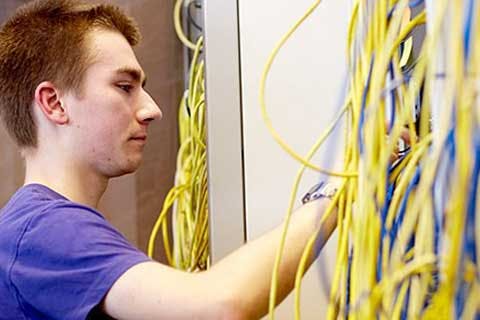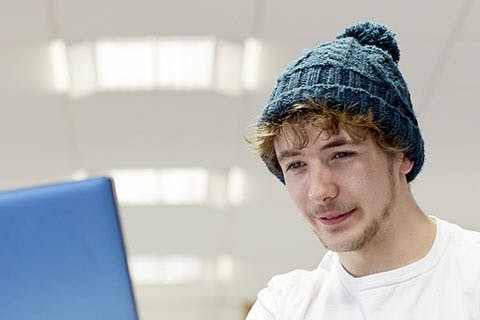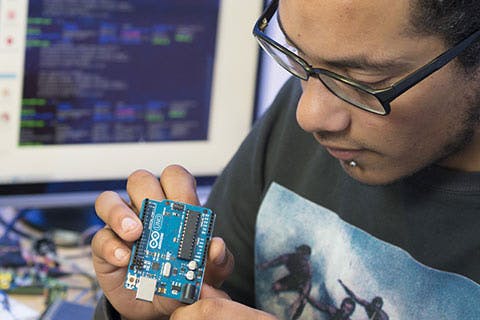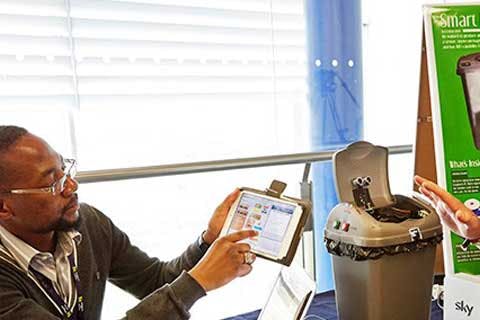
Digital Transformation - MSc
Currently viewing course to start in 2024/25 Entry.
Digital Transformation is an innovative MSc degree course designed for those who want to pursue careers as managers and leaders in implementing technology-based information systems solutions and managing technological transformation within organisations.
- Level Postgraduate Taught
- Study mode Full Time/Part Time
- Location City Centre
- Award MSc
- Start date September 2024, January 2025
- Fees View course fees
- School School of Computing and Digital Technology
- Faculty Faculty of Computing, Engineering and The Built Environment
This course is:
Open to International Students
Overview
Digital Transformation is an innovative MSc degree course designed for those who want to pursue careers as managers and leaders in implementing technology-based information systems solutions and managing technological transformation within organisations.

Introducing STEAMhouse
STEAMhouse is a centre for technology, innovation, creative thinking, prototyping and business development. Our brand new £70 million pound building is the new home for the School of Computing and Digital Technology.
What's covered in this course?
Digital Transformation Specialists must understand the complex relationships between people, information, processes and technology in order to support business with digital development. The course will equip you with the requisite multi-dimensional skillset necessary to help organisations unleash their potential to thrive in an inclusive digital society aligned with the innovative application of digital technology to transform organisations, industries and societies.
You will learn:
- Strategic IS Planning: How to develop a strategic IS/IT plan that is aligned to the strategic information needs of the business.
- Enterprise Systems: How to manage the business processes to support the organisation to gain competitive advantage, improve performance, reduce operational cost, implement efficient business processes, and improve real-time decision-making capabilities via Enterprise Systems (ES), which incorporates ERP, CRM, SCM, and so forth.
- Technology Optimisation and Integration: How to analyse the current business IT status, plan technology solutions and develop a roadmap for legacy systems migration.
- Digital Change Management: How to address the socio-technology challenges of leveraging value from the IS/IT in the digital society using agile methods. This involves making sense of the business requirements in order to ensure the end products will solve the business problem.
- Business Intelligence and Technology Entrepreneurship: How to manage and apply a range of visualisation tools to analyse and make business sense of data lakes, and to exploit data to construct informed business decisions.
- Principles of Project Management: How to deliver strategic value within an organisation and ensure the project (or business solution) is completed on time, within budget, within scope and at the desired performance level.
- Individual Master’s Project: A practice-based module working in collaboration with an organization or research-based project within the Socio-Technical Systems Research group to apply multi-disciplinary skills to design innovative solutions to the challenges of digital transformation.
To further recognise the significance of employability and to complement the academic content of this programme you are also provided the opportunity to undertake SAP Certification in Enterprise Resources Planning (ERP).
Graduates from the course will be equipped for careers in a range of sought-after positions including: Junior Consultant, Project Manager, Change Analyst, Digital Transformation – Business Analyst, Business Intelligence Analyst and Digital Transformation Leader.
Tailor your degree
The Professional Placement version of the course is optional and is offered as an alternative to the standard version of the course. This will allow you to complete a credit bearing, 20 week Professional Placement as an integral part of your Master’s Degree. The purpose of the Professional Placement is to improve your employability skills which will, through the placement experience, allow you to evidence your professional skills, attitudes and behaviours at the point of entry to the postgraduate job market.
The relationship between all the modules was so on point, especially after completing the Enterprise Systems Management and Digital Change Management Course Modules. These modules helped me achieve what I was looking for when implementing certain change management techniques and applying gap analysis techniques to processes needed to increase operational efficiencies and user experience.
This course's in-depth knowledge and experience also prepared me for future job roles. I have been offered a Senior Business Analyst Consultant role in one of the U.K.'s top I.T management consulting companies. Without this course, I wouldn't have accomplished the wealth of knowledge I received from it and without a doubt, it will add to my future experience in the new job.
Bolanle Balogun
Why Choose Us?
- You will have the opportunity to work in teams and collaborate on projects.
- You will learn through case studies, live briefs, discussion and plenary to develop a greater understanding of current challenges facing business and enterprise.
- You will develop management and consultancy skills through critical thinking, appraisal and analysis.
- You will enjoy a high-quality learning experience aligned to real-life business development challenges.
- Graduates of this course are highly sought-after with the multidisciplinary skills necessary to manage strategic and high impact enterprise change.
- The Faculty is a member of SAP University Alliance. This programme provides you with the opportunity to undertake SAP certification in a number of key areas including Enterprise Resource Planning and Business Warehouse.
OPEN DAY
Join us on campus where you'll be able to find out more about your course, learn about postgraduate finance and get an insight into studying at BCU. Booking for the next event isn’t open yet. Register your interest below and we’ll email you as soon as booking goes live.
Next Event: 29 June 2024
Entry Requirements
Essential Requirements
|
A good UK honours degree at 2:2 or above/equivalent in computing, information systems, information technology, business information systems, business information technology, business technology, business manufacturing technology, or any other degree in computing and IT subjects. |
|
In exceptional circumstances, if you have relevant professional experience, you may be invited to an interview and test, at which you will be required to demonstrate the necessary knowledge and understanding for entry onto the course. |
Additional information for EU/International students
| Essential |
|---|
|
An equivalent overseas qualification in computing, information systems, information technology, business information systems, business information technology, business technology, business manufacturing technology or any other degree in computing and IT subjects. |
|
If you do not possess the above qualifications, you may also be considered if you can provide evidence of the necessary knowledge and skills to successfully complete the course. |
|
Overseas students need to demonstrate a good command of English. IELTS 6.0 or equivalent is needed before you can enrol in this programme. |
If you have a qualification that is not listed, please contact us.
Fees & How to Apply
UK students
Annual and modular tuition fees shown are applicable to the first year of study. The University reserves the right to increase fees for subsequent years of study in line with increases in inflation (capped at 5%) or to reflect changes in Government funding policies or changes agreed by Parliament. View fees for continuing students.
Award: MSc
Starting: Sep 2024
- Mode
- Duration
- Fees
- Full Time
- 12 months
- £9,710 in 2024/25
- Full Time
- 18 months with Professional Placement (see below*)
- £10,685 in 2024/25
- Part Time
- 24 months
- Show fees
- £1079 per 20 credits
- Year 1 - 80 credits
- Year 2 - 100 credits
Fees for Part-time students
This course can be studied on a Part-time study basis. The cost per year of study is based on credit requirements for that year.
Award: MSc
Starting: Jan 2025
- Mode
- Duration
- Fees
- Full Time
- 12 months
- £9,710 in 2024/25
- Full Time
- 18 months with Professional Placement (see below*)
- £10,685 in 2024/25
- Part Time
- 24 months
- Show fees
- £1079 per 20 credits
- Year 1 - 80 credits
- Year 2 - 100 credits
Fees for Part-time students
This course can be studied on a Part-time study basis. The cost per year of study is based on credit requirements for that year.
International students
Annual and modular tuition fees shown are applicable to the first year of study. The University reserves the right to increase fees for subsequent years of study in line with increases in inflation (capped at 5%) or to reflect changes in Government funding policies or changes agreed by Parliament. View fees for continuing students.
Award: MSc
Starting: Sep 2024
- Mode
- Duration
- Fees
- Full Time
- 12 months
- £17,710 in 2024/25
- Full Time
- 18 months with Professional Placement (see below*)
- £19,485 in 2024/25
Award: MSc
Starting: Jan 2025
- Mode
- Duration
- Fees
- Full Time
- 12 months
- £17,710 in 2024/25
- Full Time
- 18 months with Professional Placement (see below*)
- £19,485 in 2024/25
Professional Placement option*
The Professional Placement option will allow you to complete a credit bearing, 20 week Professional Placement as an integral part of your Master’s Degree. The purpose of the Professional Placement is to improve your employability skills which will, through the placement experience, allow you to evidence your professional skills, attitudes and behaviours at the point of entry to the postgraduate job market. Furthermore, by completing the Professional Placement, you will be able to develop and enhance your understanding of the professional work environment, relevant to your chosen field of study, and reflect critically on your own professional skills development within the workplace.
You will be responsible for finding and securing your own placement. The University, however, will draw on its extensive network of local, regional and national employers to support you in finding a suitable placement to complement your chosen area of study. You will also benefit from support sessions delivered by Careers+ as well as advice and guidance from your School.
Placements will only be confirmed following a competitive, employer-led selection process, therefore the University will not be able to guarantee placements for students who have registered for the ‘with Professional Placement’ course. All students who do not find a suitable placement or do not pass the competitive selection process will be automatically transferred back to the standard, non-placement version of the course.
Personal statement
You’ll need to submit a personal statement as part of your application for this course. This will need to highlight your passion for postgraduate study – and your chosen course – as well as your personal skills and experience, academic success, and any other factors that will support your application for further study.
Not sure what to include? We’re here to help – take a look at our top tips for writing personal statements and download our free postgraduate personal statement guide for further advice and examples from real students.
Course in Depth
Module
In order to complete this course a student must successfully complete all the following CORE modules (totalling 180 credits):
Organisations are embracing computing technology in daily operations to enable integration, collaboration, interaction, and the processing needs of the entire organisation. One of these computing technologies that has become an essential part of an organisation's IT portfolio is Enterprise Systems (ES), which incorporates ERP, CRM, SCM, and so forth. ES are a comprehensive, configurable, and integrated suite of systems and information resources, which support organisational-wide operational and management processes. ES eases integration of different processes, people, and technology to help streamline operations. Thus, in an organisation, you will be required to make judgements on the selection, design, and implementation of these systems. Also, you will be required to manage business transformation by implementing efficient business processes to support gaining competitive advantage, improved performance, reduced operational cost, and enhanced real-time decision-making capabilities. This module equips you to develop core skills and knowledge to assist organisations in the management of ES and business processes change.
Modern enterprises make extensive use of IT systems, but rarely do all of these systems work seamlessly together. In this module, you learn how to integrate disparate systems that form part of a modern enterprise.The process starts by understanding the business processes and the existing IT systems, before assessing whether these systems need to be replaced, amended or integrated as-is.
Part of this will require an understanding of data, data formats and equivalency between disparate systems and the challenges of mapping this from one system to another. Taking this onward, you will learn how to design an IT architecture that supports the gathered requirements in a sustainable and maintainable way. Once the design has been developed, you will devise a plan to implement the architecture in a way that minimises disruption to business processes and systems.
Information systems (IS) are a key resource in organizations providing the ability to capture, access and leverage information to improve decision-making and gain competitive advantage. The planning, development and maintenance of IS therefore needs to be aligned with the strategic direction of the organization. This module explores the role of strategic information systems planning within the context of rapid technological changes and digital transformation. You will learn how to select appropriate tools for analysing the information needs of an organization. You will develop the knowledge and practical skills needed to formulate and implement effective IS strategies that inform and align with the strategic direction of organizations in different industries. You will also gain experience of effectively communicating and engaging with stakeholders in order to develop practical IS plans.
This module focuses on the challenge, how to address human-technology barriers and challenges to leverage the value of the people necessary to drive innovation and growth in a digital global society.
The module is concerned with the social context in which technology is employed and the relationship that develops thereby. The module focuses on effective strategic thinking and a holistic integration approach to IT challenges and barriers. The module debates the interdependent relationship between people, processes and technology to deliver enterprise solutions able to exploit information and IT in a constantly changing international context. A range of socio-technical factors driving organisational change will be considered specifically in terms of how the factors affect the performance needs of an organisation and influence organisational efficiency gains. The module provides the link between the Strategic Information Systems Planning module and similarly complements the values covered in the Principles of Project Management. Furthermore, significant to the module is the emphasis it places on the critical role of people in end-to-end management of Enterprise Systems.
In this module you will explore the concepts of business intelligence and entrepreneurship in today's global marketplace. Business intelligence has enabled entrepreneurs and existing organisations to gain competitive advantages and highlight new opportunities in both new and existing markets.
Whilst entrepreneurs have key characteristics including aspects of creativity and innovation, similar skills and knowledge are also essential to existing organisations. Throughout this module, students will gain practice-based skills through the application of a variety of tools and techniques pertaining to entrepreneurship and business intelligence, including the use of software data analytics tools.
Project management is the application of processes, methods, knowledge, skills and experience to achieve the project objectives (PMBoK, 6th Ed. (2012). Project management is key to delivering strategic value within an organisation and it involves far more than a time plan, a budget and a risk register. Projects can range from construction of a new building to the launch of new product, or outsourcing previous in-house functions, to the re-engineering of products, services and processes. This module will deal with the two main stages of any project: PLANNING and IMPLEMENTATION.
The purpose of the module is to enable you to undertake a sustained, in-depth and research-informed Level 7 project exploring an area that is of personal interest to you. In agreement with your supervisor, you will decide upon your topic which will take the form of a practical outcome (artefact) with accompanying contextual material. The main consideration when choosing your topic is that it must be aligned to the programme you are studying and informed by the research strategy of your school, and you should consider the relevance of this topic to your future academic or professional development.
Professional Placement Year (optional)
In order to qualify for the award of MSc Digital Transformation with Professional Placement, a student must successfully complete all of the Level 7 modules listed above as well as the following Level 6 module:
This module is designed to provide you with the opportunity to undertake a credit bearing, 20-week Professional Placement as an integral part of your Master’s Degree.
The purpose of the Professional Placement is to improve your employability skills which will, through the placement experience, allow you to evidence your professional skills, attitudes and behaviours at the point of entry to the postgraduate job market. Furthermore, by completing the Professional Placement, you will be able to develop and enhance your understanding of the professional work environment, relevant to your chosen field of study, and reflect critically on your own professional skills development within the workplace.
Download course specification
Download nowOur teaching philosophy revolves around you both ‘learning by doing’ and also transferring acquired knowledge to others. Activities will be conducted both individually and in teams, with tutors providing leadership and mentoring aimed at supporting your transition into independent learners. In this partnership, we will be encouraging you to become proactive, so that you can develop your confidence to undertake a range of progressively complex and challenging tasks.
We expect you to attend all teaching sessions, as well as to read and prepare before these sessions. Good preparation will enable you to get the most from your contact time and will help you become an autonomous learner. Advanced preparation is also a critical skill which you must develop if you wish to succeed in business or professional practice. Teaching sessions will include lectures and small group interactive seminars.
You will be assessed in a number of different ways, including coursework, patchwork assessment, examinations (seen and unseen, open and closed-book), presentations, practical assignments, vivas, online forums, podcasts and project work.
Professional Placement option*
The Professional Placement option will allow you to complete a credit bearing, 20 week Professional Placement as an integral part of your Master’s Degree. The purpose of the Professional Placement is to improve your employability skills which will, through the placement experience, allow you to evidence your professional skills, attitudes and behaviours at the point of entry to the postgraduate job market. Furthermore, by completing the Professional Placement, you will be able to develop and enhance your understanding of the professional work environment, relevant to your chosen field of study, and reflect critically on your own professional skills development within the workplace.
You will be responsible for finding and securing your own placement. The University, however, will draw on its extensive network of local, regional and national employers to support you in finding a suitable placement to complement your chosen area of study. You will also benefit from support sessions delivered by Careers+ as well as advice and guidance from your School.
Placements will only be confirmed following a competitive, employer-led selection process, therefore the University will not be able to guarantee placements for students who have registered for the ‘with Professional Placement’ course. All students who do not find a suitable placement or do not pass the competitive selection process will be automatically transferred back to the standard, non-placement version of the course.
Employability
Enhancing your employability skills
Birmingham City University programmes aim to provide graduates with a set of attributes which prepare them for their future careers. The BCU Graduate:
- is professional and work-ready
- is a creative problem solver
- is enterprising
- has a global outlook.
The University has introduced the Birmingham City University Graduate+ programme, which is an extracurricular awards framework that is designed to augment the subject-based skills that you develop through your programme with broader employability skills, enhancing your employment options when you leave university.
The programme will help you with crafting your CV, personal statements, covering letters and presentations, and will also help you seek part-time work experience and voluntary placements.
International
Birmingham City University is a vibrant and multicultural university in the heart of a modern and diverse city. We welcome many international students every year – there are currently students from more than 80 countries among our student community.
The University is conveniently placed, with Birmingham International Airport nearby and first-rate transport connections to London and the rest of the UK.
Our international pages contain a wealth of information for international students who are considering applying to study here, including:
- Explore some of the good reasons why you should study here.
- Find out how to improve your language skills before starting your studies.
- Find all the information relevant to applicants from your country.
- Learn where to find financial support for your studies.
Facilities & Staff
Our Facilities
We are constantly investing in our estate and are currently in the process of spending £260 million on new learning facilities. This course will be taught at Millennium Point at the City Centre Campus.
The course is supported with a wide range of cutting-edge facilities in the City Centre Campus. We have a state-of-the-art computer games technology lab which contains high-performance PCs, Sony PlayStation development kits and a range of industry standard software including Unity, Unreal and a suite of professional Microsoft development tools.
We also have many open access areas where students can study together and even hire out laptops for use in these spaces and others within the university.
Within the University there are many internationally recognised research teams giving you the opportunity to collaborate with them on exciting interdisciplinary projects.

Computer networking
The laboratories are well-equipped for all our computer networking courses, as well as specialist areas for practical work such as voice-over internet protocol (VoIP), forensic and ethical hacking technologies, wireless and mobile technologies and radio frequency identification technologies to name but a few.

Software development and computer programming
There are a number of open access, software development and computer programming laboratories that can be used to develop systems and programmes, including database management systems such as MySQL, to name but a few.

Systems laboratories
Our embedded systems laboratories are used to develop real-time systems, such as specialist hardware training and development resources, and industrial-standard software development and simulation tools. These include microcontroller software and robotics design and development, to name but a few.

Electronic systems
To underpin the basic principles of electronic systems, we have a well-equipped laboratory of general and specialist test and measurement kits, including powered prototyping development boards, dual power supplies, frequency generators and counters and digital multi-meters to name but a few.
Forensic computing
Our successful development of forensic computing has led to a specialist forensics laboratory that is fully equipped with essential hardware and software for this sensitive area of study. The laboratory includes high-spec PCs with built-in multi interface Tableau write blockers, EnCase and FTK computer forensic software and steganography detection and analysis software, to name but a few.
More on our facilities
Our staff
Deborah Evans
Associate Professor
Deb Evans is an Associate Professor in the Centre for Digital Transformation at Birmingham City University. She is the Academic Lead for the Digital Systems and Change Team within the Centre for Digital Transformation. She teaches Strategic Information Systems Planning, Enterprise Systems, IT Innovation, Business intelligence and Technology...
More about Deborah
